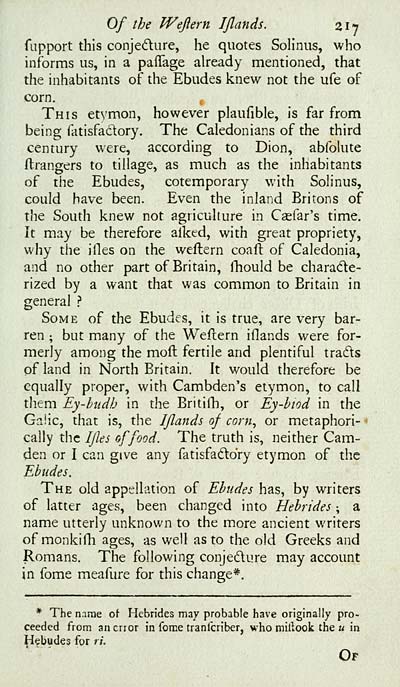Blair Collection > Critical dissertations on the origin, antiquities, language, government, manners, and religion, of the antient Caledonians, their posterity the Picts, and the British and Irish Scots
(255)
Download files
Complete book:
Individual page:
Thumbnail gallery: Grid view | List view

Of the Wejlern IJlands. zij
fupport this conjedure, he quotes Soh'nus, who
informs us, in a pafTage already mentioned, that
the inhabitants of the Ebudes knew not the ufe of
corn.
This etymon, however plaufible, is far from
being fatisfadory. The Caledonians of the third
century were, according to Dion, abfolute
ftrangers to tillage, as much as the inhabitants
of the Ebudes, cotemporary with Solinus,
could have been. Even the inland Britons of
the South knew not agriculture in Caefar's time.
It may be therefore aiked, with great propriety,
why the illes on the weftern coaft of Caledonia,
and no other part of Britain, fhould be characfte-
rized by a want that was common to Britain in
general .?
Some of the Ebudes, it is true, are very bar-
ren ; but many of the Weftern iflands were for-
merly among the moft fertile and plentiful trads
of land in North Britain. It would therefore be
equally proper, with Cambden's etymon, to call
them Ey-hndb in the Britifh, or Ey-hiod in the
Ga!ic, that is, the IJlands of corn, or metaphori- -
cally the IJks of food. The truth is, neither Cam-
den or I can give any fatisfaddry etymon of the
Ebudes.
The old appellation of Ebudes has, by writers
of latter ages, been changed into Hebrides ; a
name utterly unknown to the more ancient writers
of monkifh ages, as well as to the old Greeks and
Romans. The following conjedure may account
in fome meafure for this change*.
* The name of Hebrides may probable have originally pro-
ceeded from an error in forae tranlcriber, who millook the « in
Hebudes for ri.
Of
fupport this conjedure, he quotes Soh'nus, who
informs us, in a pafTage already mentioned, that
the inhabitants of the Ebudes knew not the ufe of
corn.
This etymon, however plaufible, is far from
being fatisfadory. The Caledonians of the third
century were, according to Dion, abfolute
ftrangers to tillage, as much as the inhabitants
of the Ebudes, cotemporary with Solinus,
could have been. Even the inland Britons of
the South knew not agriculture in Caefar's time.
It may be therefore aiked, with great propriety,
why the illes on the weftern coaft of Caledonia,
and no other part of Britain, fhould be characfte-
rized by a want that was common to Britain in
general .?
Some of the Ebudes, it is true, are very bar-
ren ; but many of the Weftern iflands were for-
merly among the moft fertile and plentiful trads
of land in North Britain. It would therefore be
equally proper, with Cambden's etymon, to call
them Ey-hndb in the Britifh, or Ey-hiod in the
Ga!ic, that is, the IJlands of corn, or metaphori- -
cally the IJks of food. The truth is, neither Cam-
den or I can give any fatisfaddry etymon of the
Ebudes.
The old appellation of Ebudes has, by writers
of latter ages, been changed into Hebrides ; a
name utterly unknown to the more ancient writers
of monkifh ages, as well as to the old Greeks and
Romans. The following conjedure may account
in fome meafure for this change*.
* The name of Hebrides may probable have originally pro-
ceeded from an error in forae tranlcriber, who millook the « in
Hebudes for ri.
Of
Set display mode to: Large image | Transcription
Images and transcriptions on this page, including medium image downloads, may be used under the Creative Commons Attribution 4.0 International Licence unless otherwise stated. ![]()
| Permanent URL | https://digital.nls.uk/76289416 |
|---|
| Description | A selection of books from a collection of more than 500 titles, mostly on religious and literary topics. Also includes some material dealing with other Celtic languages and societies. Collection created towards the end of the 19th century by Lady Evelyn Stewart Murray. |
|---|
| Description | Selected items from five 'Special and Named Printed Collections'. Includes books in Gaelic and other Celtic languages, works about the Gaels, their languages, literature, culture and history. |
|---|

